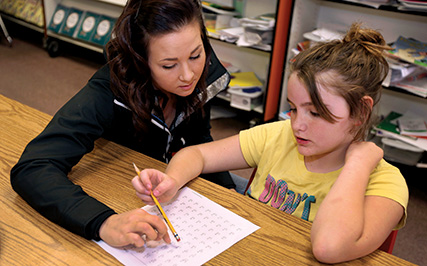Culture
Reeves helping to teach the Grand Ronde story

Tribal member Mercedes Reeves is appropriately one of first to teach the Grand Ronde Tribe's fourth-grade Tribal history curriculum while she is still a student teacher.
This is the curriculum's pilot school year for this project initiated late last spring of 2013. As far as Trinity Minahan, the Education Department's Curriculum Specialist, knows, this is the only Tribe-specific curriculum aligned to state and common core standards in lesson plan format and classroom ready.
The curriculum aims to right local and statewide historical errors, past and present.
Reeves, 25, also was a student teacher in Springfield and Keizer elementary schools earlier in the school year. From the end of March, however, to the end of school this year she is teaching the new curriculum at Willamina Elementary.
"When I came in the curriculum was already in process," Reeves said. "I had attended one of the conferences held at the Grand Ronde gym that introduced the curriculum. I got information about the program and the standards. I asked for my full-time student teaching to be at Willamina."
Reeves works in the fourth-grade class of Brian Jones, who said that the Grand Ronde curriculum is one-fourth, or nine weeks, of the grade's social studies section.
"It gives another perspective (to the other parts of the social studies class). There are 15 lessons and we expected to complete each one in 45 minutes," Jones said. "But some lessons spread over into two days, and it ended up taking 20 to 25 days to do the whole unit."
The Grand Ronde section complemented units on geography, government and Oregon history.
Jones said he values Reeves' contribution to the unit "because she has the background. I only have what I've been told or read. When the students made canoes, I would have said to paint them brown. She could tell them about how brightly the canoes are painted. She can talk about canoe journeys."
Likewise with the students, the handful who are members of the Tribe "are very eager to share what they know with the rest of the class," Reeves said. "And the class was very excited to learn how the Grand Ronde Tribe traveled with canoes. They were interested and engaged with our history."
Reeves worked three years at the Tribe's K-5 program overlapping her first two undergraduate years at Umpqua Community College.
Until her last year at Umpqua, she did not know what she wanted to do with her education. Then, she took her first education class.
"I had to observe in a classroom," she said, "and then I knew it was exactly what I wanted to do."
She finished her bachelor's of science degree at Western Oregon University majoring in inter-disciplinary studies with focus areas in humanities, social sciences and education.
She attended the one-year master's degree program in Education at the University of Oregon. While there, she joined the Sepsik'wałá program for Native American students. A group of four met monthly to "check in with how we were doing on our studies, and ask about any support we needed. Program Director CHiXapkaid (Dr. Michael Pavel) was a giant help through this whole process."
The class opened up opportunities to attend conferences and related Native education programs.
"I would 100 percent recommend the University of Oregon campus for that alone," she said.
With four master's level classes still to complete, she expects to graduate from the U of O at the beginning of August.
Meanwhile, Reeves is imparting knowledge to fourth-graders and importing it from her experiences in the classroom.
She said of the lessons from teaching, "What haven't I learned? A lot about myself: the amount of patience I have, and when I consider students' experiences, I see how it affects their lives and the lives of the people around them."
"She knows how to look at the lesson," said Jones, "knows how it's going to help the kids and line up with the common core. She knows how to connect it so it fits into their whole learning experience."
"In class," Reeves said, "it is super important to know the students and the life they have at home, and how you can best help them be successful."
Her challenge as a student teacher is "to come into a new classroom and have the students think of me as a teacher, not just a helper for the teacher."
She said she feels rewarded by "having the freedom to create your own lessons, creating those that kids find interesting, when they absorb everything you teach them, when they give it their all whether it is something they were already interested in, and even if it's a subject they don't care for."
The entire school, she says, is excited about this unit. "There is a lot of Native American history that is out on the market, much very inaccurate," she says. "The school in general is excited to have accurate information to share."
In addition to her teaching internship with the K-5 Tribal Education program, Reeves, who is from Roseburg, said that for many years her family traveled to Grand Ronde each summer for the Contest Powwow.
"That was something I really enjoyed. Now that I'm closer, I'll be able to be part of the community and learn more about where I came from and my heritage," she said.
